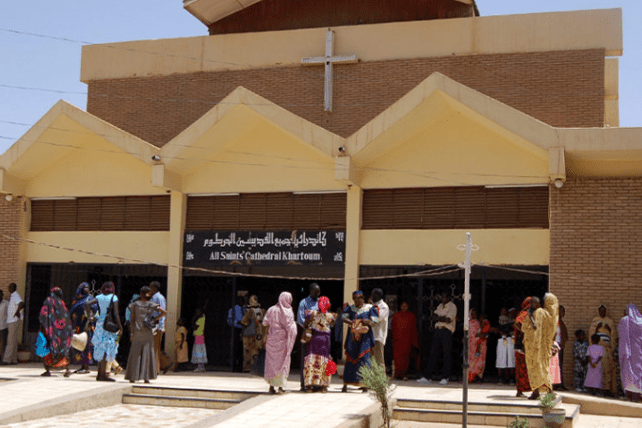NAIROBI, Kenya (RNS) — Despite the Sudanese civil war that’s devastated the region, the All Saints Anglican Cathedral in Khartoum is still standing. But its compound is now a graveyard, with a vandalized altar and missing pews, which have been chopped by soldiers for firewood, according to Archbishop Ezekiel Kondo.
At the start of the war in April 2023, the cathedral was the seat of Kondo, the 67-year-old primate of the Episcopal (Anglican) Church of Sudan. On April 15, 2023, fighters from the paramilitary Rapid Support Forces quickly seized the compound, flipping it into an operation base while Kondo and his family remained inside.
“It happened very abruptly. Nobody expected it,” Kondo recalled, speaking to RNS from Port Sudan, a city on the Red Sea where he has sought refuge since June of last year. “It was Saturday when we were in the office preparing for the Sunday service, after the first week of Easter Sunday. We heard a very heavy sound of gunfire, only to get out and find heavy smoke billowing nearby.”
The war for control over northeast Africa is being fought between two rival factions of the military government of Sudan: the Sudanese Armed Forces, under Abdel Fattah al-Burhan, and the paramilitary Rapid Support Forces and its allies, under the Janjaweed leader Hemedti. The factions turned on each other after jointly wresting control of the civilian government.
Restrictions on media and aid access have made precise statistics on the scale of devastation hard to obtain. The United Nations estimates that 750,000 people are at threat of starvation, while U.S. envoy Tom Perriello has estimated that the war has killed as many as 150,000 people. Other estimates are much lower, at about 15,000 confirmed deaths. The war has also displaced more than 10 million people, making it the largest global displacement crisis, and left an additional 25 million in urgent need of humanitarian aid, over half of the country’s population.
For some, this is the second civil war they’ve fled in recent years. In South Sudan, nearly 400,000 people were killed in clashes from 2013 to 2018.
The cathedral is close to the army headquarters and the airport, where the full-scale war broke out during Ramadan last year. With the armed confrontation intensifying, the Rapid Support Forces had rushed its soldiers to surround the church compound, hoping the place of worship would not be bombed and would guarantee them some protection.
“They were there at the gate and we were unable to do anything. We were unable to get out,” Kondo said. “All the families that were there gathered in the church hall. Other people also ran and joined us. We spent three nights there.”
After three days in the cathedral’s basement without water or food, Kondo and other leaders decided to leave. After interrogations at gunpoint, the soldiers finally allowed them to go. The church leaders and their families then walked for an hour and a half to find transport to take them to the south of Khartoum with less violence. Kondo’s family remained there for two months, only to move again after the bombardment became more intense and closer.
“One of the shells fell near where we were,” Kondo said. He then decided to move with his family to Port Sudan. “It was very difficult, but we thank God. He has been our protector.”
In Port Sudan, Kondo continues to call for peace as he ministers in the diocese there, while staying in touch with Anglicans still in Khartoum.

